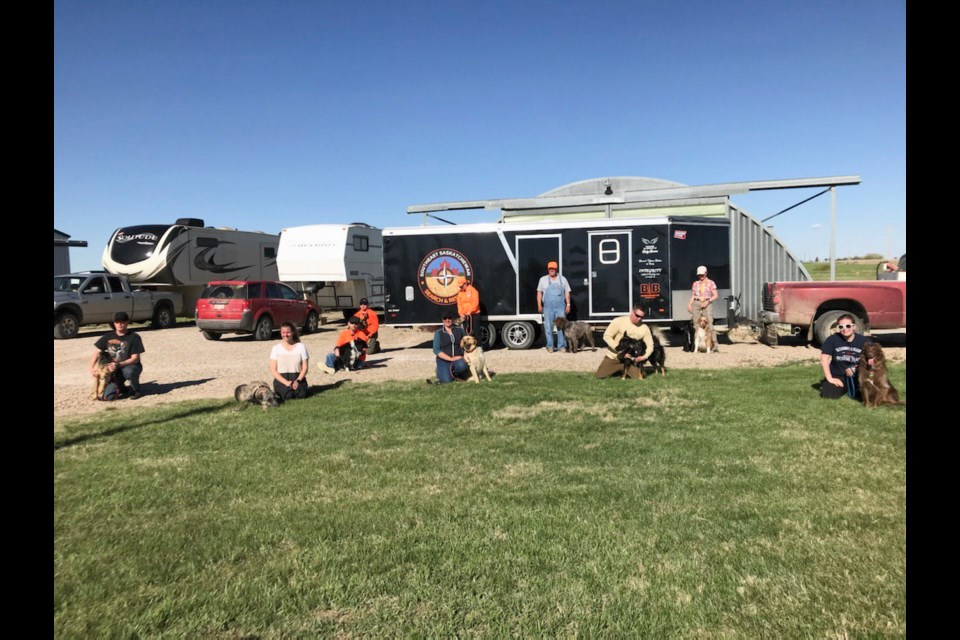The South East Saskatchewan Search and Rescue (SESKSAR) volunteer group made a major move and organized the first-ever province-wide canine training program.
Twelve handler-K9 teams gathered in the Carnduff area recently at the property of Katia Bigney, the president of the local chapter and the K9 director for the Search and Rescue Saskatchewan Association of Volunteers (SARSAV), to start their two-year journey, which will end up with the certification and will see the creation of the first civilian SAR K9 unit.
It means that when handlers learn how to work with their canines, and the dogs get fully trained, they will go through the RCMP’s examination and will become a resource in any potential search and rescue operations.
The invitation to partake in the training was sent out to all 20 SAR chapters in Saskatchewan, and volunteer groups from the southeast, along with Regina, Prince Albert and Saskatoon, used the unique opportunity to learn a lot of new information and skills, and also build stronger bonds with their animals.
“We had an excellent group. Everyone was just super supportive of one another. Dan Vas from Search Dog Association, from Medicine Hat, was our instructor. He came on Friday evening, and we did some group training, just socialization with the dogs,” Bigney said.
The training saw all kinds of dogs, including German and Australian shepherds, hunting dogs and mix breeds participating. All of them had to have a basic level of obedience, but Bigney said they will have a separate obedience and agility training workshop organized later this year to strengthen and develop this set of skills, as those are also two RCMP testing criteria.
“My goal is to bring all the tools to the canine teams to succeed. Dan Vas is our instructor for search and rescue. And I do have an obedience and agility trainer, she'll be coming down in the fall, and she will get us going on obedience and agility, that's what she specializes in. So we are going to provide all the tools to our members to allow them to succeed, and then they have to decide, how far they want to take it,” Bigney said.
The first day saw teams focused on starting the training for the beginner-level search K9-handler teams. The group focused on basic searching skills such as beginner ground tracking, including track in and track end.
“The track in is getting your dog's nose down right at the beginning, get them focused, and then do the track itself, and then finding the article at the end. And that would be the track end. And then having them properly move out away from the article and back to the original start position,” Bigney explained.
On the second day, the group headed out to the Oxbow gravel pit to learn how the terrain changes affect how the scent moves in the air.
“It was a different terrain and we focused on scent theory, which is how a scent moves based on humidity, temperature and the topography around you, whether you have hills, whether you have long grass, whatever's around you, it can be fences, it can be bleachers, it can be buildings. The wind moves differently based on temperature, and humidity, and what's around you, and obviously wind speed, which teaches us a lot about where the scent goes and how we should perform a search based on those factors, so that we give our dog every advantage,” explained Bigney.
“There was lots to learn there. We used the gravel pit as a sort of a playground to use talcum powder to see where the wind moves the scent that the dog is trying to locate.”
Everyone went back with homework on what was necessary to do to practise the newly learned skills and also what can be done individually to improve their dog’s skills. Bigney said it was a lot to take in not only for the dogs but also for the handlers.
“If that dog is cut out for it, the handler has to learn to read their dog, to train their dog and to harmonize to get to the article. So we're going to do our best to give all those tools to every team, and they're going to go home and work hard at it, and hopefully, we all succeed. But we'll know in two years, I guess.”
The next session will take place in Regina on July 17 and 18. There will be two more SAR training sessions and one obedience and agility workshop before the end of 2021. The training will continue in 2022.
The K9 SAR team training received generous support from southeast Saskatchewan residents. Norm and Donna Klatt, and Mack Auctions donated $1,500 towards the SAR K9 unit, and Becky Bayliss also donated $100 to help cover the groups’ expanses.



